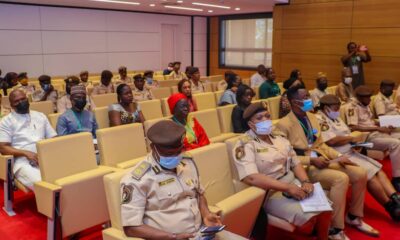Business
‘SON, Still Effective Outside Ports’
Director-General, Standards Organisation of Nigeria (SON), Dr Joseph Odumodu said that to deal with suspicious cargoes, it was better for the organisation to work within the vicinity of the ports.
Odumodu made this known when he fielded questions from newsmen in Abuja, recently.
Reports say that the Federal Government recently reduced the number of agencies operating within the ports from 14 to eight under its ports reform agenda.
SON was among agencies not listed to continue to operate within the ports, but could operate there on invitation.
“The ejection of SON is a government decision and I am aware that government must have taken that decision in the best interest of Nigerians.
“However, we are the operators and we are aware that it will better for us to deal with suspicious cargo within the vicinity of the ports than outside of the ports.
“All we have done now is that we have changed our strategy; in fact sometimes we station our people outside of the ports and when those containers come out, we pick them up and ask for details; the only challenge is logistics.’’
Odumodu said that SON needed more money and people to be able to police the markets and warehouses, stressing that monitoring was easier when those to be monitored were grouped together or were in clusters than if they were dispersed all over the country.
He added that SON had made a case to government and that “at the right time, I believe the decision will be made in the best interest of the country’’.
Commenting on manufacturers’ performance, he said that in the next five years to six years, Nigerian products would constitute at least half of consumer’s products in the country’s markets.
“Ultimately, one of the measures for our performance is that within the next five or six years, made-in-Nigeria products will constitute at least half of our consumer products.
“Because, I can tell you and am very proud to say that Nigerian manufacturers are meeting all the minimum standards; most of them are meeting the minimum standard of the Nigeria Industrial Standards (NIS).
“If we are able to support them to increase their outputs, then we will already be solving the problems that we currently involved in.
“And in addition to that, if we increase their outputs, they will increase their capacities, they will employ more Nigerians; they will pay more tax.’’
Odumodu said current development in the manufacturing sector in the area of producing quality goods was in consonance with President Goodluck Jonathan’s transformation agenda, job creation and Economic development.
Business
Kenyan Runners Dominate Berlin Marathons
Kenya made it a clean sweep at the Berlin Marathon with Sabastian Sawe winning the men’s race and Rosemary Wanjiru triumphing in the women’s.
Sawe finished in two hours, two minutes and 16 seconds to make it three wins in his first three marathons.
The 30-year-old, who was victorious at this year’s London Marathon, set a sizzling pace as he left the field behind and ran much of the race surrounded only by his pacesetters.
Japan’s Akasaki Akira came second after a powerful latter half of the race, finishing almost four minutes behind Sawe, while Ethiopia’s Chimdessa Debele followed in third.
“I did my best and I am happy for this performance,” said Sawe.
“I am so happy for this year. I felt well but you cannot change the weather. Next year will be better.”
Sawe had Kelvin Kiptum’s 2023 world record of 2:00:35 in his sights when he reached halfway in 1:00:12, but faded towards the end.
In the women’s race, Wanjiru sped away from the lead pack after 25 kilometers before finishing in 2:21:05.
Ethiopia’s Dera Dida followed three seconds behind Wanjiru, with Azmera Gebru, also of Ethiopia, coming third in 2:21:29.
Wanjiru’s time was 12 minutes slower than compatriot Ruth Chepng’etich’s world record of 2:09:56, which she set in Chicago in 2024.
Business
NIS Ends Decentralised Passport Production After 62 Years
Business
FG To Roll Out Digital Public Infrastructure, Data Exchange, Next Year
-

 Politics5 days ago
Politics5 days agoRivers Assembly Resumes Sitting After Six-Month Suspension
-

 Featured5 days ago
Featured5 days agoPANDEF Hails Tinubu For Lifting Emergency Rule In Rivers
-

 News5 days ago
News5 days agoFAAC Disburses N2.225trn For August, Highest In Nigeria
-

 News5 days ago
News5 days agoFG Ends Passport Production At Multiple Centres After 62 Years
-
Maritime2 days ago
Minister Tasks Academy On Thorough-Bred Professionals
-
Maritime2 days ago
Customs Cautions On Delayed Clearance, Says Consignees May Lose Cargo
-
Maritime2 days ago
NCS Sensitises Stakeholders On Automated Overtime Cargo Clearance System
-
Maritime2 days ago
Lagos Ready For International Boat Race–LASWA

